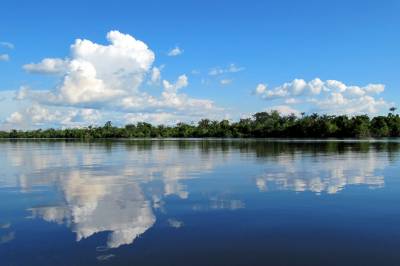Yesterday, the 25th of September, the Iquitos Water Defense Committee – of which Alianza Arkana is a founding member – attended the Regional Summit for the Defense of the Amazon in the city of Iquitos in the Peruvian Amazon.
The talks presented at the summit made it clear that, unless there is a drastic change in direction, above all by the regional government, the Nanay River, one of the last remaining pristine river basins in the Peruvian Amazon, will be open for oil production.
During the summit, an international petition was launched on the online platform AVAAZ with the aim of collecting signatures to pressure the current Peruvian Minister of Energy and Mines, Jorge Merino Tafur, to save the Nanay River from environmental devastation.
The Nanay River Basin is a tributary to the mighty Amazon and provides 90% of the drinking water for Iquitos, a city of a half a million people. It is also an area of extraordinary cultural and biological diversity, home to three protected areas, and, until now, one of few Amazonian tributaries in Peru to be untouched by oil exploitation.
However, Gran Tierra Energy – a Canadian oil giant – recently acquired 100 percent of the shares of two oil concessions near the headwaters of the Nanay and plan to move forwards with oil exploitation in this pristine and vital ecosystem.
If we don’t act now to halt Gran Tierra’s activities, the future looks bleak. – please sign this petition!
This is an urgent attempt to stop the continuation of the same industrial development model that has plagued the Amazon for more than 40 years benefitting primarily foreign shareholders yet leaving a devastating legacy of harm with entire river systems having now been declared to be “environmental states of emergency” due to contamination of heavy metals that result from oil exploitation practices.
The Summit was organized by the Iquitos Water Defense Committee, a united front of students, civil society organizations, indigenous peoples and concerned citizens that has been at the forefront of the struggle to protect the Nanay River from environmental destruction caused by the extractive industries.
Several prominent invitees made their way to this summit. Peruvian congress woman Veronica Mendoza once again spoke up in favor of embracing the plurality of cultures that live within Peru, and the urgent need of changing the political course of the country to truly participatory ways of governing and respecting the multitude of visions and alternative ways of development.
The Mayor of Lima, Susana Villarán, spoke to the audience congratulating the effort of the event: “Defending water is defending quality of life” she said, while also pointing to the eminent fact that the Nanay is crucial for the population of Iquitos.
Equally important was the participation of dozens of indigenous leaders from various river basins in the Northern Peruvian Amazon, as well as an indigenous representative from the Andean region of Cañaris, advocating for water rights on a national scale.
Both Emerson Sandi Tapuy, President of the regional organization of indigenous people of Loreto (ORPIO) and Aurelio Chino Dahua, President of the indigenous federation of the Quechua from the Pastaza (FEDIQUEP), spoke in detail about the environmental disaster that 40 years of oil activity has left behind on their ancestral territories. They saluted the effort of the event to bring together such a diverse group of people from the region, and expressed serious concerns about industrial development across the Amazon and the imminent threat that is now being posed to the Nanay.
Jose Manuyama, one of the Water Committee’s coordinators, then took the stage to congratulate the indigenous representatives for their leadership in the struggle to prove that their territories are in fact contaminated. Referencing the recent government declarations of environmental emergency on the Pastaza and Corrientes Rivers, Mr. Manuyama called on the urban population to apologize for allowing what he called a “slow genocide” of the indigenous people over the last four decades. Finally, he affirmed the Water Committee’s interminable commitment to preventing this tragedy from happening in the Nanay.
Thursday, 26 September 2013

